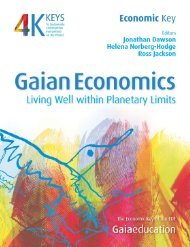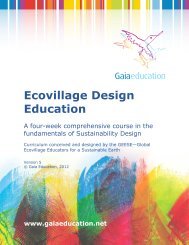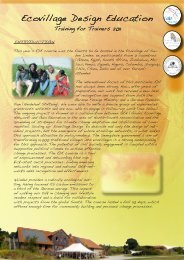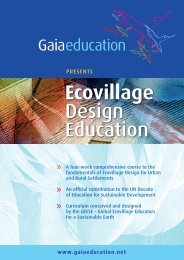Designing Ecological Habitats - Gaia Education
Designing Ecological Habitats - Gaia Education
Designing Ecological Habitats - Gaia Education
Create successful ePaper yourself
Turn your PDF publications into a flip-book with our unique Google optimized e-Paper software.
inging tHe Harvest Home : csa farming anD farmer eDucation at itHaca 121<br />
programming for occasional interns, or tours for Cornell University<br />
students. What would happen, we pondered, if our non-profit educational<br />
organization, the EVI-Center for Sustainability <strong>Education</strong>, worked jointly<br />
with West Haven Farm to provide hands-on educational opportunities for<br />
budding farmers?<br />
The idea got traction at a special fundraising dinner, held in the fall<br />
of 2008, which featured Cornell University President David Skorton and<br />
his wife, Dr. Robin Davisson, as keynote speakers. Skorton and Davisson<br />
each spoke passionately about local food, and recounted how Cornell was<br />
beginning to change its buying habits to source 25% of its produce from<br />
within 100 miles. Clearly the university, which feeds 24,000 people daily,<br />
and has a $9 million annual grocery budget has a lot of economic clout.<br />
(In 2009 the policy grew to include 33% of the produce purchased by the<br />
University.) One of the issues brought up by the speakers was the need for<br />
more local farms as the demand for locally-sourced products multiplies.<br />
After the dinner was over, my friend and former EcoVillage neighbor<br />
Joanna Green came up to me. “Liz, I know what I want to do with my life<br />
now,” she told me, her face glowing with conviction. “I want to be the person<br />
who makes this idea happen.” Under Joanna’s guidance, ‘this idea’ became<br />
a fast-growing program, Groundswell Center for Local Food and Farming.<br />
Joanna took early retirement from Cornell, where she had worked for over<br />
two decades in sustainable agriculture education and research. Drawing on<br />
her extensive network of contacts in local food and farming, she put together<br />
a terrific advisory board, including representatives from Cornell Cooperative<br />
Extension, Ithaca College, graduate students, farmers and more.<br />
The Groundswell mission “is all about helping youth and adult learners<br />
develop the skills and knowledge they need to build sustainable local food<br />
systems. Our focus is providing hands-on, experiential learning opportunities<br />
with real working farms and food businesses in the Ithaca, NY area. Through<br />
collaboration with area schools, colleges and universities Groundswell offers<br />
programs of study for beginning farmers, students, community members, and<br />
professionals.” (www.groundswellcenter.org)<br />
After over a year of careful organizing, Groundswell Center taught its<br />
first ‘Summer Practicum in Sustainable Farming’ in the summer of 2010.<br />
Fourteen young adults spent eight weeks learning through hands-on training<br />
at three local farms – West Haven (a vegetable farm), Kingbird Farm (a<br />
horse-powered farm that specializes in grass-fed beef, pork, poultry and<br />
eggs), and Northland Sheep Dairy (featuring production and marketing<br />
of gourmet sheep’s milk cheeses.) The Practicum included in-depth fieldtrips<br />
to visit other local producers and retailers, some academic study,<br />
and students enjoyed preparing their own local foods lunch each day of<br />
the program with the help of a nutritionist from Ithaca College. They ate<br />
delicious, seasonal food which they had often harvested themselves, and in<br />
a closing dinner for supporters of the program, several students noted that







